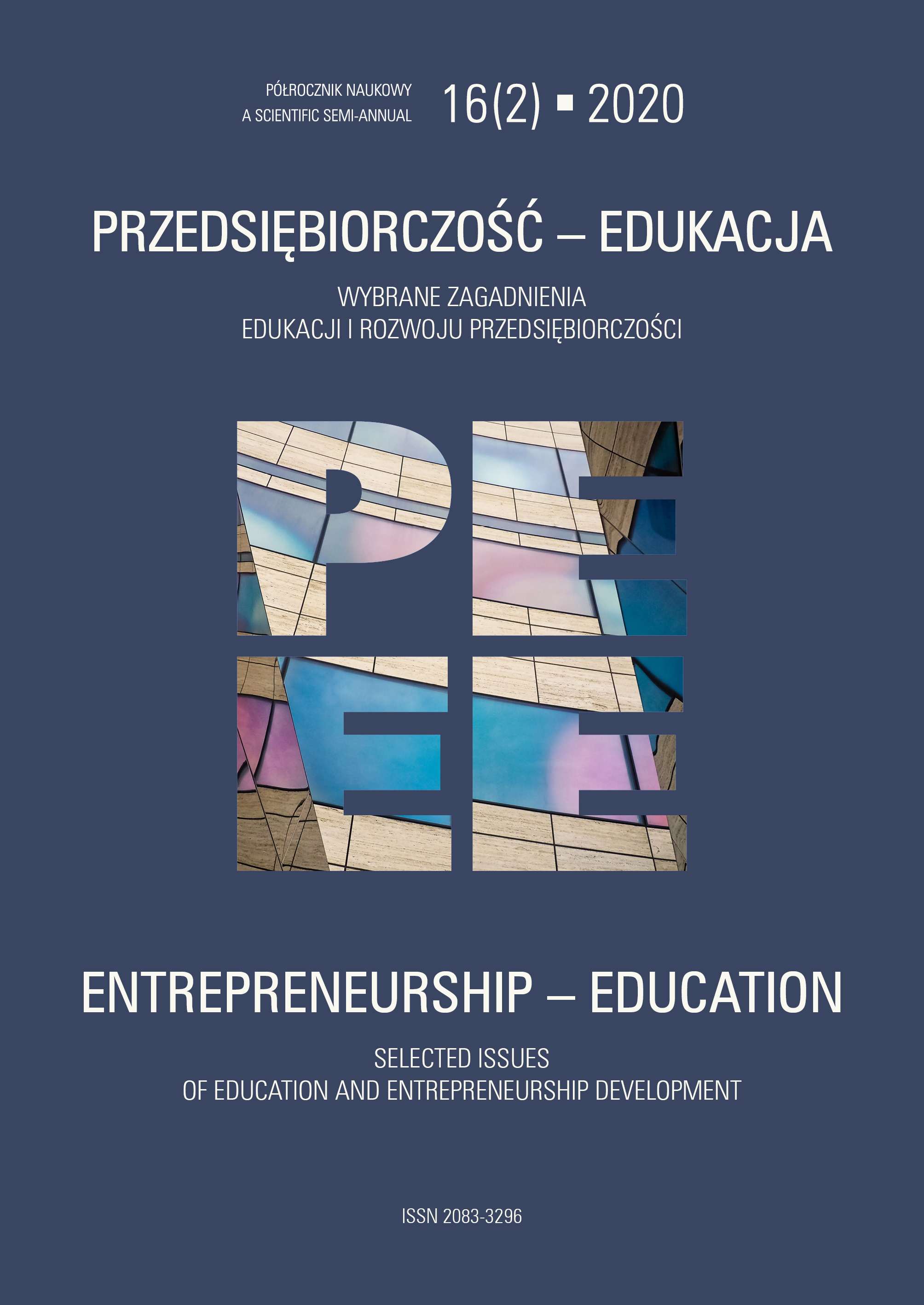Postawy wobec przedsiębiorczości uczniów w młodszym wieku szkolnym
DOI:
https://doi.org/10.24917/20833296.162.4Słowa kluczowe:
edukacja przedsiębiorcza, edukacja wczesnoszkolna, kompetencje przedsiębiorcze, postawa przedsiębiorcza, przedsiębiorczość, strategie rozwijania przedsiębiorczościAbstrakt
W artykule podjęta została tematyka rozwijania kompetencji przedsiębiorczych u uczniów w młodszym wieku szkolnym. Termin „przedsiębiorczość” wyjaśniono w kontekście podstawowych dokumentów regulujących kwestię rozwijania kompetencji kluczowych na I etapie kształcenia, a także przykładowych dobrych praktyk i strategii, służących rozwijaniu postawy przedsiębiorczej. Celem przeprowadzonych badań było uzyskanie informacji o tym: jak uczniowie klas trzecich definiują terminy: „przedsiębiorczość”, „przedsiębiorca”, czy uważają się za osoby przedsiębiorcze i czy dostrzegają w szkole inicjatywy podejmowane na rzecz stymulowania tej ważnej dla skutecznej edukacji kompetencji. W badaniach wykorzystano metodę sondażu diagnostycznego i technikę ankiety. Uzyskane wyniki nie służą formułowaniu uogólnień czy stawianiu tez, lecz sygnalizują, że badani uczniowie rozumieją terminy: „przedsiębiorczość” i „przedsiębiorca” w sposób potoczny, który odbiega od definicji literaturowych. Badani respondenci nie posiadają wystarczającej wiedzy o cechach charakteryzujących osobę przedsiębiorczą, a podejmowane w szkołach działania na rzecz rozwijania postawy przedsiębiorczej są realizowane w niewystarczającym zakresie.
Bibliografia
Andrzejczyk, A. (2016). Wpływ edukacji a rozwój przedsiębiorczości. Raport z badań. Białystok: Polskie Towarzystwo Ekonomiczne.
Brzezińska, A. Schmidt, J. (2008). Przedsiębiorczość jako warunek udanego startu w dorosłość. W: A. Andrzejczak (red.), Przedsiębiorczość w edukacji. Poznań: Wydawnictwo Akademii Ekonomicznej, 21–23.
Fundacja Młodzieżowej Przedsiębiorczości. (2020, 15 marca). Program: Od grosika do złotówki. Pozyskano z: https://od-grosika-do-zlotowki.junior.org.pl/pl
Gołębiowski, G. (2014). Analiza finansowa przedsiębiorstwa. Warszawa: Difin.
Holmgren, C., From, J. (2005). Taylorism of the Mind: Entrepreneurship Education from a Perspective of Educational Research. European Educational Research Journal, 4(4), 382–390.
Kapica, G. (2015). Modernizacja organizacji procesu kształcenia młodszych uczniów. W: E. Smak, K. Wereszczyńska, A. Malec (red.), Współczesne trendy w edukacji. Opole: Wydawnictwo Uniwersytetu Opolskiego, 75–81.
Majkut, R. (2014). Przedsiębiorczość w świetle uwarunkowań interdyscyplinarnych. Warszawa: Wydawnictwo CeDeWu.
Piecuch, T. (2013). Przedsiębiorczość. Podstawy teoretyczne. Warszawa: Wydawnictwo C.H. Beck.
PKO Bank Polski. (2020, 15 marca). Komplet scenariuszy lekcji o finansach dla nauczycieli kl. I–III. Pozyskano z: http://www.pkobp.pl/media_files/61171a02-81d3-40f7-aba6-2af2751a4af7.pdf
Rachwał, T. (2019). Kształtowanie kompetencji przedsiębiorczych. W: T. Rachwał (red.), Przedsiębiorczość jako kompetencja kluczowa w systemie edukacji. Warszawa: Wydawnictwo FRSE, 16–35.
Roudaki, J. (2009). University Students Perceptions on Entrepreneuruschip: Cmmerce Students Attitudes ad Lincoln University. Journal of Accouting – Business and Management, 16(2), 36–53.
Rozporządzenie Ministra Edukacji Narodowej z dnia 14 lutego 2017 r. w sprawie podstawy programowej wychowania przedszkolnego oraz podstawy programowej kształcenia ogólnego dla szkoły podstawowej, w tym dla uczniów z niepełnosprawnością intelektualną w stopniu umiarkowanym lub znacznym, kształcenia ogólnego dla branżowej szkoły I stopnia, kształcenia ogólnego dla szkoły specjalnej przysposabiającej do pracy oraz kształcenia ogólnego dla szkoły policealnej. Dz.U. 2017, poz. 356.
Sadowska, M. (2016). Edukacja w zakresie przedsiębiorczości w polskim systemie kształcenia oraz w państwach europejskich. Przedsiębiorczość Międzynarodowa, 2(1), 149–164.
Ustawa z dnia 14 grudnia 2016 r. Prawo Oświatowe. Dz.U. 2019, poz. 1148 ze zm.
Uygun, R., Kasimoglu, M. (2013). The Emergence of Entreneurial Intentions in Indigenous Entrepreneurs: The Rolle of Personal Backgrount on the Antecedents of Intentions. International Journal of Business and Management, 8(5), 24–40.
Wach, K. (2013). Edukacja na rzecz przedsiębiorczości wobec współczesnych wyzwań cywilizacyjno-gospodarczych. Przedsiębiorczość – Edukacja [Entrepreneurship – Education], 9, 246–257.
Zalecenie Parlamentu Europejskiego i Rady z dnia 18 grudnia 2006 r. w sprawie kompetencji kluczowych w procesie uczenia się przez całe życie (2006/962/WE).
Zalecenie Rady z dnia 22 maja 2018 r. w sprawie kompetencji kluczowych w procesie uczenia się przez całe życie (Tekst mający znaczenie dla EOG), Dz.Urz. UE 2018/C 189/01.
Pobrania
Opublikowane
Jak cytować
Numer
Dział
Licencja
Artykuły publikowane są zgodnie z warunkami licencji Creative Commons (CC BY-ND 4.0; uznanie autorstwa-bez utworów zależnych).

